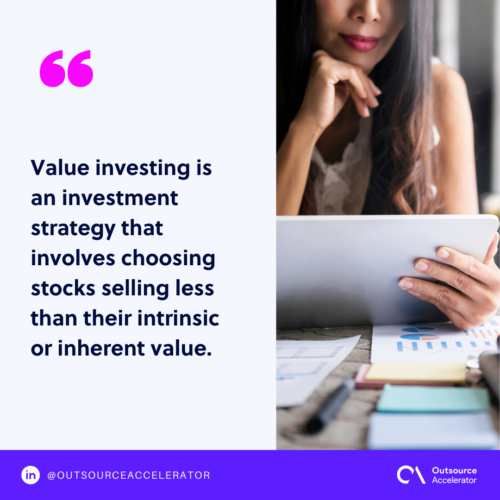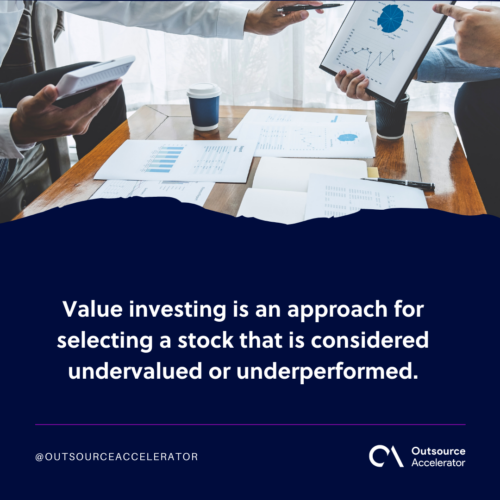Value investing
Definition
What is value investing?
Value investing is an investment strategy that involves choosing stocks selling less than their intrinsic or inherent value. These are the stocks considered to be undervalued or underperforming in the stock market.
The concept of “value investing” was developed by finance adjunct Benjamin Graham and finance professor David Dodd, MS ’21, at Columbia Business School in 1902s.
Additionally, value mutual funds can be beneficial for investors. By investing in value mutual funds, investors will get a more diversified portfolio, which will be less vulnerable.
Today, it is one of the investment strategies that value investors use the most, hoping that the stocks will eventually be valued over the long term.
As of May 2022, the MSCU World Value Index drops around 7% in total returns, far better than the growth index’s fall of 25%. This means that investors tend to purchase cheaper shares with metrics like book value as well as profits.
According to Bank of America, the best value stock picks today include M&T Bank Corp, Lam Research Corp, Best Buy Co., Warner Bros Discover, and more.

How does value investing work?
Value investing features two concepts. One is undervaluation, where the stock is trading at a lower price rather than its intrinsic value. In contrast, overvaluation is when the stock is trading at a higher price than its inherent value.
The stocks become undervalued when the overall market significantly moves and crashes due to external circumstances, the herd mentality of the investors, and economic fluctuations.
Value investors set their own “margin of safety.” This principle is key to successful value investing with an assumption of earning a profit by purchasing cheaper stock and selling them eventually.
Value investing metrics
Determining the intrinsic value of stocks involves a fundamental analysis of the company’s performance, earnings, revenues, profit, cash flow, target market, brand, business model, and market advantage.
As such, stocks are measured through fundamental metrics such as price-to-earnings (P/E), price-to-book (P/B), price-to-sales, and debt-to-equity ratio.
Price-to-earnings ratio (P/E)
Price-to-earnings ratio (P/E), sometimes referred to as price multiple or earnings multiple, is a ratio for valuing the company’s worth based on its share prices relative to its earnings per share (EPS).
This ratio can be used in comparing a company’s overall markets against one another.
Price-to-book ratio (P/B)
Price-to-book (P/B) is used to measure a company’s market value — usually its assets — compared with its book value figure.
Price-to-sales ratio (P/S)
Price-to-sales ratio is a valuation metric calculated by dividing the company’s total sales and revenues by the company’s market capitalization (per-share stock price) over the past 12 months.
Debt-to-equity ratio (D/E)
The debt-to-equity ratio is calculated by dividing the company’s total liabilities by the total shareholder’s equity.
It is an important financial metric that tells if the company has the ability to raise capital to finance its operations.
Free cash flow
Cash flow is the net amount of cash generated by the company’s revenues. Cash flow moves into and out of business. Companies that have free cash flow indicate that they will have cash remaining to invest, pay debt or dividends, and issue buyback shares.
What is the difference between value investing and growth investing?
Value investing is an approach for selecting a stock that is considered undervalued or underperformed. In growth investing, however, investors tend to choose companies that are expected to grow in their profits or revenues in the long term.
Both value investing and growth investing overlap in the sense that they have similar goals but different approaches.
Growth investors seek future potential in stocks through growth companies, while value investing seeks stock price that has the potential to rise again.

The contrarian mindset of value investors
Value investors tend to have a contrarian perspective. This means they don’t follow the herd (often, it is an irrational behavior of emotional investors). With a contrarian mindset, they go against the trends.
Value investors that possess a contrarian mindset tend to stand or hold back. They are not attracted to household names but instead focus on the stock’s intrinsic value.
Investors don’t believe in the efficient market hypothesis, and they stick to the current investment strategy in which they will avoid losing money. Value investors’ focal point is the company’s fundamentals and financials.
It is important to note that value investing requires a long-term investment mindset. It can offer a variety of benefits, such as value stocks generating consistent returns. Unlike growth stock, value investing is less volatile.
However, value investing isnt a risk-free investment. The loss of investment is when the stock may potentially decline in value to less than the amount invested. Value investing is also time-consuming.







 Independent
Independent




